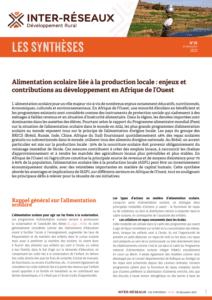Niger, owing to its climatic, institutional, livelihood, economic, and environmental context, is one of the most vulnerable countries of the world. Poverty is pervasive in Niger and it ranks low on almost all the human development indicators. Agriculture is the most important sector of Niger’s economy and accounts for over 40 percent of national gross domestic product (GDP) and is the principle source of livelihood for over 80 percent of the country’s population. The performance of the agricultural sector, however, due to its high exposure to risks, is very volatile. Niger has experienced multiple shocks, largely induced by agricultural risks over the past 30 years, which impose high welfare cost in terms of food availability, food affordability, and malnutrition. It also adversely affects household incomes, performance of the agricultural sector, the government’s fi scal balance, and the growth rate of Niger’s economy.
Recognizing the need to explicitly and comprehensively address agricultural risks, the Government of Niger, through 3N high commissioner, requested the World Bank to conduct an agricultural sector risk assessment of Niger. This risk assessment enriches the existing knowledge base of the agricultural sector in Niger and provides the following contributions:
(1) systematically analyzes a whole range of agricultural risks and its impact over a longer time period (1980–-2012); (2) helps situate drought in the context of other agricultural risks; (3) prioritizes the most important agricultural risks for the country based on objective criterion; (4) provides a framework of mitigation-transfer-coping to manage priority risks; and (5) offers a fi ltering mechanism to select high return interventions for agricultural risk management.







